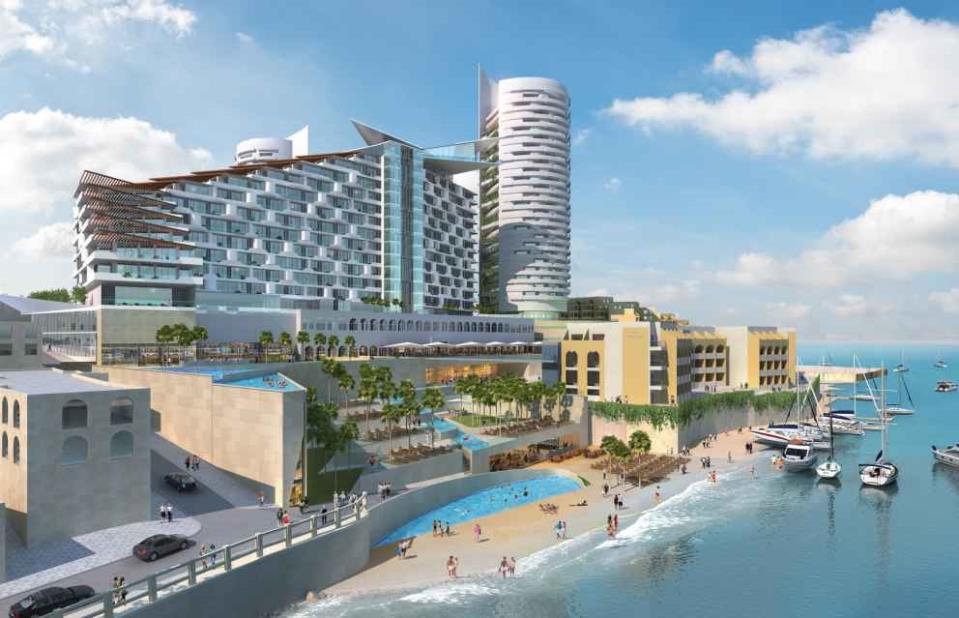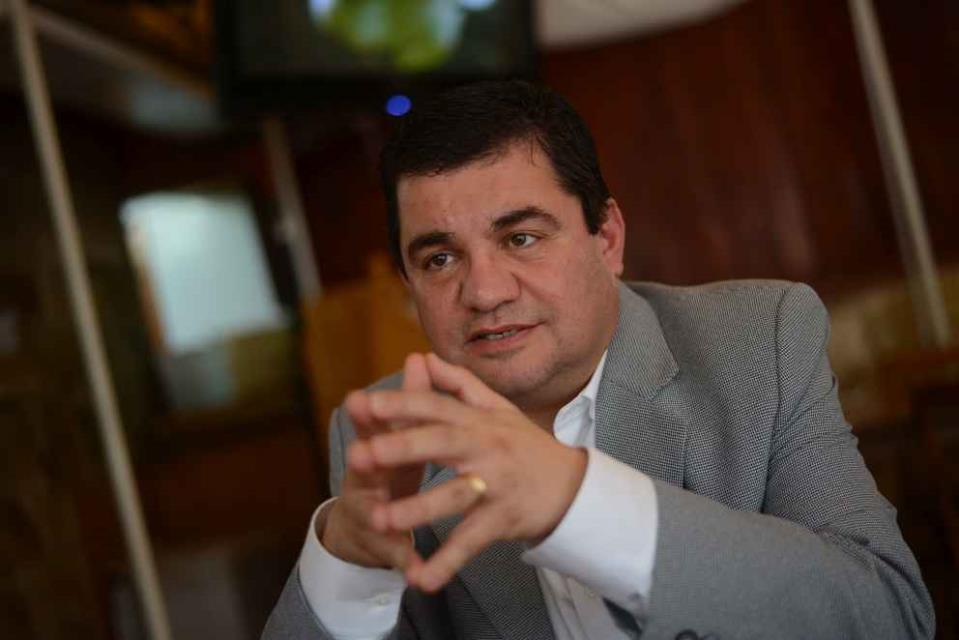Speaking to this newspaper, Mr Gauci did not deny having discussed the project with the two major political parties before the last general election, and explained that the tender issued by the current administration, apart from including a long list of conditions, will also bind the company to a €10 million performance guarantee.
In November last year, Projects Malta issued a call for tenders for the development of “an upmarket mixed tourism and leisure project” including a five-star hotel, residences, shopping and entertainment.
Although two other entities had collected the tender document by the closing date of January this year, only the Seabank Group submitted a bid.
Projects Malta subsequently found the bid compliant with all the requirements and a process of negotiations with the government over the cost of the public land was launched and is still ongoing. According to the Group’s CEO, this tender placed some of the strictest conditions on bidders he has ever seen.

The project
The project proposal includes the creation of the first Hard Rock Hotel in Malta and one of the first in Europe. The hotel franchise already has 22 hotels across the globe. If approved, it will be the second one in Europe, after Ibiza, with another one in Berlin in the pipeline.
“The Hard Rock Hotel is a very strong brand and has all the ingredients to create completely new markets. For instance, in Ibiza, which is known as a party-goers destination, the new Hard Rock Hotel created a new and booming conference market.”
He argued that although tourism in Malta has been breaking records for five years, this project is poised to open the coveted, truly upmarket niche. “We have been in the tourism business for many years and we know that we have to break new ground to reach even higher.”
The project will also include Michelin star restaurants and the introduction of world class consumer brands to the islands.

Residential towers
Two residential towers will sit on 2,000 square metres of land in total. These towers will occupy less than 20 per cent of the total gross floor area and less than 10 per cent of the footprint area of the whole project. “Compared to other projects proposed for the area, the real estate proportion is very small,” Mr Gauci said.
He explained that the beach will not be touched and the foreshore will remain completely open to the public.

Financial package to government
“This is not a simple transfer of land,” Mr Gauci explained. “We had to present a comprehensive and detailed package with clear guidelines as to what the government receives in return.”
The Times of Malta had reported that the land would be sold for some €6.5 million, quoting experts claiming that the land is worth between €80 million and a €100 million.
Arthur Gauci said that in view of ongoing negotiations, he is not in a position to divulge how much the company is offering for the land. But he insists that the amount is “much more” than the €6.5 million reported in the media.
“What I can tell you now, and you can verify this if the negotiations succeed, the wild figures bandied around by ‘experts’ who spoke to the media are based on completely wrong assumptions. As I noted, less than 10 per cent of the footprint will be dedicated to real estate.”

Seabank Group tied with a €10 million performance guarantee
Mr Gauci explained that to benchmark the cost of public land, they looked at other projects being proposed in the immediate vicinity, including that of the Corinthia and the one proposed for the Villa Rosa site.
“There are a number of similarities between the Villa Rosa project and ours. Apart from being adjacent, the size and features are also very similar.”
The Malta Independent on Sunday acquired a copy of the available contract for the development of Villa Rosa, which shows that the area was sold for €15.1 million.
Mr Gauci explained that there was, however, a crucial difference between the two situations, with enormous financial consequences – the Villa Rosa contract is freehold, while the government will grant Seabank only a 99-year concession. He argued that while the Villa Rosa was a simple contract between two private entities, the one for ITS site comes with a long list of “very strict” requirements and conditions.
One particular requirement states that the investor is to be tied with a performance guarantee equivalent to around €10 million. “In my long experience I have never seen a performance guarantee of this size,” he adds with a look of apprehension.
“This means that if we violate certain conditions stipulated in the tender, the government can withdraw €10 million from our account.”
The contract ties the investors to create a minimum of 1,350 jobs. This is in addition to the work created during the construction phase. The Group will also be obliged to invest more than €200 million into the project. Another €100 million will be invested by the commercial outlets operators.
“Most importantly, one has to look at the multiplier effect that this project will have on the country’s economy. Experts estimate that Malta’s economy will get a boost of over €750 million.”

A pre-electoral deal?
Mr Gauci did not deny discussing this project with the two major political parties before the last general election. “Let me be very clear. A project of such size and stature is not planned in a day or two.
He said that originally discussions with the previous administration revolved around the building of a hotel. “In fact, top officials from Hard Rock Hotels had come to Malta and met with former Prime Minister Lawrence Gonzi to discuss the designs.”
Mr Gauci said it was the present government which decided to develop the project further and aim for an all-round upmarket destination.
“A few years ago we introduced the concept of an all-inclusive hotel in Malta. Many told us that it would not work. Yet here we are today, having opened the second such hotel and we are stronger than ever.”
‘We did not get any preferential treatment’
“For some reasons unknown to us, The Times of Malta has tried to cast doubts on this project. They have been publishing inaccuracies without having the decency of first checking the facts with us. The process was completely transparent and open. Everyone who wished to compete had all the opportunity to do so.
“We have no problem answering any questions from any media on any aspect of the project. Indeed, that is what we are doing today. I invite the media to do the same with the Corinthia and Villa Rosa proposals.”
Pressed on the price of the public land that will be bought, Mr Gauci said that they based their offer on land bought on the open market for similar projects in the vicinity. He added that the government has hired an international firm of auditors to conduct its research and establish the valuation of the land in question. “The government has to make sure that ours is the best offer for that land. We are ready for this process of scrutiny because we did not receive any preferential treatment. On the contrary, the only thing we insist on is that our project gets the same treatment as all the others in the area.”

‘Reservation agreements are not a promise of sale’
Challenged on the fact that the group is already accepting deposits on the luxury apartment which are planned to be built in the area, Mr Gauci explained that these deposits are not a promise of sale.
The company’s CEO said that the company is simply accepting reservation agreements, and the interest is coming both from Maltese and foreigners who are willing to invest in our country. Those who have shown interest are individuals who have confidence in the Group and the project. “These are men and women who wish to be part of in this ambitious project.
“Given that negotiations are still underway, we utilised a financial instrument – reservation agreements – which is common practice in the real estate sector, both locally and abroad.”
The company’s CEO added that a deposit to reserve a property is not legally binding. “It is not even a promise of sale, let alone a contract. Of course, it could not be otherwise as negotiations with the government are still ongoing. All those who have reserved a property are fully conscious of this state of affairs. The government can still walk away.” To reserve a floor in one of the towers requires a deposit of €50,000.
“From a private investment level, this project is one of the biggest, if not the biggest project ever seen on the island. Commercial responsibility requires that an investor leaves no stone unturned to make sure that whatever is promised is delivered.”
He said that the group assessed the project’s potential in a lot of detail before the plan actually took off. “Do you think we decided to consider this huge investment without making detailed calculations? We spoke to banks and stockbrokers to get the reassurance we needed.” he said.
“It would have been very irresponsible if we presented this vision lightly, without rock-solid financial foundations. Let’s put aside all the money involved. We are talking about people’s lives here. Our responsibility lies with our employees and their families. The Seabank Group employs more than 2,200 people and whatever risk we take can affect their lives.”